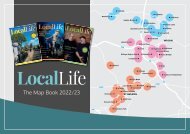You also want an ePaper? Increase the reach of your titles
YUMPU automatically turns print PDFs into web optimized ePapers that Google loves.
56<br />
Digestive problems<br />
and how to overcome them<br />
Bloating, nausea, abdominal pain, constipation and<br />
diarrhoea. These are all common digestive problems that we<br />
all experience and usually they can be treated with ‘over the<br />
counter’ medicines. Some conditions might be as a result of<br />
overindulging or eating the wrong food, but with Christmas<br />
round the corner, what can we do to avoid them?<br />
With more of us working from<br />
home, it’s all too easy to<br />
eat a rushed sandwich in<br />
front of the computer,<br />
skip lunch altogether<br />
or grab a snack while<br />
preparing the kids’ tea.<br />
How you eat is a major<br />
consideration, as eating<br />
too quickly and not<br />
swallowing food<br />
properly can lead to<br />
digestive problems.<br />
As Roberta Baldo,<br />
nutritional therapist<br />
from Baldo & Mason<br />
says “Eat slowly. This<br />
allows time for the<br />
signals from the<br />
senses to get to the<br />
brain and stimulate<br />
the production of<br />
digestive enzymes, muscular<br />
contractions and other<br />
processes necessary for<br />
digestion, before the food<br />
arrives.”<br />
Chewing food properly also<br />
helps with digestion. As<br />
Roberta says, “If food is not<br />
chewed properly, digestion<br />
is impeded and may take<br />
much longer because the<br />
food does not have sufficient<br />
surface area exposed to the digestive juices for digestion<br />
to occur efficiently.”<br />
Taking your time over a meal is also important. At<br />
Christmas, we’ll all have plenty of time to linger over a<br />
meal, but Roberta advises to eat mindfully and “focus on<br />
your meal rather than eat whilst doing other things. How<br />
we eat is as important as what we eat.”<br />
Irritable Bowel Syndrome (IBS)<br />
Digestive problems often settle down by themselves,<br />
but sometimes symptoms persist that could indicate<br />
other conditions, such as Irritable Bowel Syndrome<br />
(IBS). According to The IBS Network, this affects over<br />
twelve million people in the UK. Classic symptoms<br />
include abdominal pain, bloating, change in bowel<br />
habits, diarrhoea and constipation. Alison Reid, CEO, The<br />
IBS Network, says “It is a very individual condition and<br />
symptoms will vary for each person. Other symptoms<br />
can include lethargy, nausea and backache. There is no<br />
specific cause for IBS but the most common risk factors<br />
are a gastroenteritis attack, a traumatic or upsetting<br />
event and courses of powerful antibiotics.”<br />
What causes IBS to flare up? Contributory factors include<br />
the food that we eat and the stress in our lives.<br />
Self-management is the key to living well with IBS, says<br />
Alison. “Once you have a better understanding of what<br />
is happening in your body you will be able to explore<br />
what treatments work best for you. These include dietary<br />
and lifestyle changes, psychological therapies and<br />
medications – see your GP or pharmacist for advice. These<br />
may be used together or on their own depending on the<br />
possible cause and severity of the condition.”<br />
Managing general lifestyle and diet is vitally important<br />
when dealing with IBS, says Dr Simon Smale, consultant<br />
gastroenterologist and clinical director, Manchester<br />
University NHS Trust. “Small meals eaten often rather than<br />
one big meal at the end of the day,” he says. “Ensure you<br />
don’t drink too much caffeine and alcohol as they can have<br />
dire effects. If the condition is primarily diarrhoea, avoid


















